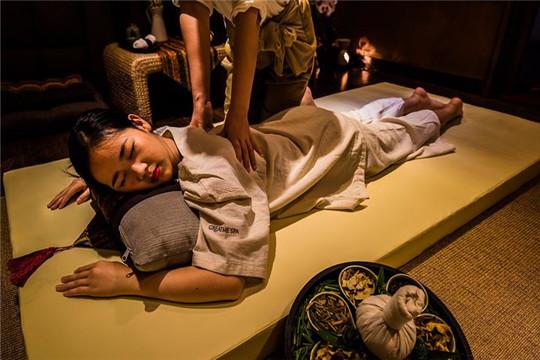- 本文目录导读:
- The Principles of Traditional Chinese Medicine
- The Role of Herbal Medicine in TCM
- Commonly Used Herbs in TCM
- Applications and Benefits of Herbal Medicine
- Individualized Treatment in TCM
- Integrating TCM with Modern Healthcare
- Conclusion
Traditional Chinese Medicine (TCM) is a profound and complex system of healthcare that has been practiced for thousands of years. It encompasses a range of practices, but at its heart lies a fundamental principle: the balance and harmony of the body and mind. Among the many facets of TCM, herbal medicine stands out as a cornerstone, playing a crucial role in maintaining and restoring health. This article delves into the world of TCM, exploring the principles, benefits, and applications of herbal medicine in the context of holistic wellness.
The Principles of Traditional Chinese Medicine
At the core of TCM is the concept of Qi (pronounced "chee"), the vital life force that flows through the body. Qi is believed to be essential for health and vitality, and its proper flow and balance are critical for maintaining wellness. According to TCM, illness arises when there is a disruption or imbalance in the flow of Qi. This can be caused by various factors, including stress, poor diet, environmental influences, and emotional disturbances.
To address these imbalances, TCM practitioners utilize a holistic approach, considering the body, mind, and spirit as interconnected. They employ various techniques such as acupuncture, massage (tui na), exercise (tai chi and qigong), dietary therapy, and herbal medicine. Herbal medicine, in particular, is highly regarded for its ability to restore balance and support the body's natural healing processes.
The Role of Herbal Medicine in TCM
Herbal medicine, or "zhong yao," is one of the oldest and most widely used components of TCM. It involves the use of plants, minerals, and sometimes animal products to create remedies that address specific health concerns. These remedies are typically formulated into teas, powders, capsules, or topical applications.
The selection of herbs is based on their properties and the principles of TCM, which include the concepts of Yin and Yang, the Five Elements (Wood, Fire, Earth, Metal, Water), and the body's organ systems. Each herb is believed to have specific qualities, such as warming or cooling, drying or moisturizing, and can affect different organs and energy pathways (meridians) in the body.
Commonly Used Herbs in TCM
Several herbs are frequently used in TCM, each with unique properties and health benefits:
1. **Ginseng (Ren Shen)**: Known for its adaptogenic properties, ginseng is used to boost energy, reduce stress, and enhance overall vitality. It is often prescribed to improve immune function and support recovery from illness.

2. **Astragalus (Huang Qi)**: This herb is valued for its immune-boosting and anti-inflammatory effects. It is commonly used to strengthen the body's defenses against colds and infections and to support cardiovascular health.
3. **Goji Berries (Gou Qi Zi)**: Rich in antioxidants, goji berries are used to nourish the liver and kidneys, improve vision, and enhance overall vitality. They are often included in formulas aimed at promoting longevity and anti-aging.
4. **Licorice Root (Gan Cao)**: Licorice root is known for its harmonizing properties, often used to enhance the effects of other herbs in a formula. It has anti-inflammatory and immune-boosting effects and is used to soothe digestive and respiratory issues.
5. **Reishi Mushroom (Ling Zhi)**: Reishi is revered for its ability to promote calmness, improve sleep, and support the immune system. It is used to enhance mental clarity and overall well-being.
Applications and Benefits of Herbal Medicine
The applications of herbal medicine in TCM are vast and varied, addressing a wide range of health issues. Some of the primary benefits include:
1. **Balancing Hormones**: Many herbs are used to regulate hormonal imbalances, particularly in conditions like menopause, PMS, and thyroid disorders. For example, Dang Gui (Angelica sinensis) is commonly used to support female reproductive health.
2. **Enhancing Digestion**: Herbs such as Ginger (Sheng Jiang) and Peppermint (Bo He) are used to alleviate digestive issues like bloating, nausea, and indigestion. They work by warming the digestive tract and promoting the smooth flow of Qi.
3. **Supporting Mental Health**: Herbal remedies like St. John's Wort (Guan Ye Lian Qiao) and Lavender (Xun Yi Cao) are used to treat anxiety, depression, and stress. These herbs help to calm the mind and restore emotional balance.

4. **Boosting Immunity**: Herbs like Echinacea (Zi Zhu Hua) and Elderberry (Jie Gu Mu) are known for their immune-boosting properties. They help to prevent and treat infections by enhancing the body's natural defenses.
5. **Promoting Longevity and Vitality**: Many TCM herbs are used to promote longevity and enhance overall vitality. For instance, He Shou Wu (Polygonum multiflorum) is believed to support healthy aging and improve energy levels.
Individualized Treatment in TCM
One of the unique aspects of TCM is its emphasis on individualized treatment. TCM practitioners conduct thorough assessments, including pulse diagnosis, tongue examination, and detailed patient histories, to tailor treatments to each individual's specific needs. This personalized approach ensures that the selected herbs and formulas address the root cause of the health issue, rather than merely alleviating symptoms.
Integrating TCM with Modern Healthcare
In recent years, there has been a growing interest in integrating TCM with modern healthcare practices. Many people are turning to herbal medicine as a complementary approach to conventional treatments, seeking to benefit from the holistic and natural methods of TCM. Research is increasingly supporting the efficacy of TCM herbs, and more healthcare providers are recognizing their potential in promoting health and well-being.
However, it is essential to approach TCM with an informed perspective. Herbal medicine can interact with prescription medications, and not all herbs are suitable for everyone. Consulting with a qualified TCM practitioner is crucial to ensure safe and effective treatment. Additionally, sourcing herbs from reputable suppliers is important to avoid contaminants and ensure quality.
Conclusion
Traditional Chinese Medicine, with its rich history and holistic approach, offers a unique perspective on health and wellness. Herbal medicine, as a central component of TCM, provides a natural and effective means of restoring balance and supporting the body's innate healing abilities. By understanding and embracing the principles of TCM, individuals can enhance their overall well-being and achieve a harmonious state of health.
In a world where stress and chronic illnesses are increasingly prevalent, the ancient wisdom of TCM serves as a valuable resource. Whether used as a standalone therapy or in conjunction with modern medicine, herbal medicine offers a holistic approach to achieving and maintaining health. By respecting and integrating the knowledge of TCM, we can foster a deeper connection with our bodies and promote a more balanced, healthy lifestyle.
转载请注明:成都会所桑拿-四川成都休闲桑拿推荐论坛! » 武汉桑拿 » Traditional Chinese Medicine: The Ancient Art of Holistic Wellness
版权声明
本文仅代表作者观点,不代表成都休闲网立场。
本文系作者授权发表,未经许可,不得转载。































